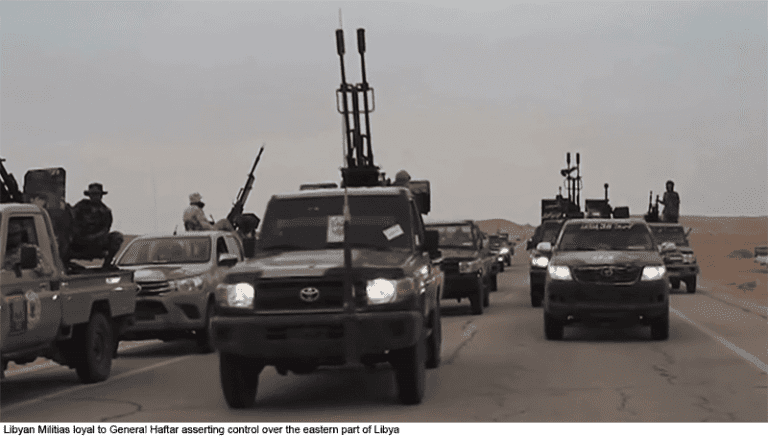
The recent crisis over Libya’s Oil Crescent has illustrated the difficulty of unifying the country in the foreseeable future. After declaring his unilateral control over the oil facilities in the crescent, the commander of the Libyan National Army, General Khalifa Haftar, faced enormous pressure from international powers which forced him to relinquish the facilities to the National Oil Corporation under the Government of National Accord (GNA) in Tripoli. While Haftar’s responsiveness to the international community is a positive sign that points to the feasibility of diplomatic negotiations, Libya’s political scene remains so toxic that military combat over the Oil Crescent occurred only a few weeks after multilateral talks in Paris that resulted in an agreement on holding national elections was reached.
As long as political fragmentation and international meddling endure, there will be neither cohesiveness nor willingness to fight IS, al-Qaeda, or other extremist groups.
The fragility on the ground is best reflected in the latest report by UN Special Envoy Ghassan Salamé, who points out the problem that could spoil planned elections in December, adding that “the few who benefit from the status quo” occupy lucrative official positions. Salamé’s report includes references to the deteriorating economy, worsening public services, revival of terrorist cells, increasing number of foreign mercenaries, serious problem of human trafficking, and the plight of refugees in the country.
Fragmentation and Militancy: Two Sides of the Same Coin
Such dire prospects render Libya as the weakest link in the war against the so-called Islamic State (IS) and other radical groups. Despite the territorial defeat of IS after the fall of Sirte in December 2016, the group still remains a potent force. Given its losses in Syria and Iraq, IS has encouraged its fighters to migrate to Libya—which has become a support zone for IS networks in Europe and Africa. IS has conducted more than 10 attacks in Libya in the past few months, including the notorious suicide bombings that targeted the High National Elections Commission in Tripoli. With an estimated 2,600-3,500 warriors, Libya’s influx has become one of the largest foreign fighter mobilizations since the 1980s.
The weakening state authority in Libya also enables cooperation between IS and al-Qaeda—an unlikely reality given the two groups’ bitter rivalry in Syria and Iraq. Libyan IS militants have kept their prior connections with al-Qaeda, which has been more successful in penetrating the local population. Not only do the two groups have an overlapping human network, but at times, they also choose to cooperate against common enemies.
Thus, addressing the threat of violent militancy with counterterrorism measures will not be sufficient in the Libyan context. As long as political fragmentation and international meddling endure, there will be neither cohesiveness nor willingness to fight IS, al-Qaeda, or other extremist groups.
Libya’s civil war shows signs of a “spoiler problem” in which opposing sides have developed symbiotic relations of survival.
Libya’s political future and the success in the war on IS are entangled and will be dependent on tackling three main challenges, namely: 1) the institutionalization of oil revenue sharing in the midst of a growing economic crisis; 2) the strengthening of local administrations; and 3) halting international interference in Libyan affairs.
Institutionalizing a Just System of Oil Revenue Sharing
The patronage culture that dominated the Qadhafi era still plagues Libya’s ruling class—a factor that encourages warlords and facilitates the formation of militias, especially in a rentier context where oil revenues have a decisive impact on the nation’s economy. Under Qadhafi, Libya did not establish modern institutions to share oil revenue; instead, the former regime’s monopoly on violence had ensured a peculiar system of distribution. Not surprisingly, since Qadhafi’s downfall, the failure to build institutions has haunted Libya’s future.
Currently, local constituencies are at the mercy of small power elites from all the conflicting parties who benefit from ongoing rivalries and infighting and have no true incentive to reach a political resolution. In this regard, Libya’s civil war shows signs of a “spoiler problem” in which opposing sides have developed symbiotic relations of survival.
Threats posed by the warlord coalition around General Haftar, for example, made the internationally recognized Tripoli-based GNA increasingly dependent on militia groups for its security in the capital. Despite the fact that these militias have remained loyal to the GNA, they have developed a self-serving patronage network by recruiting from the Qadhafi regime’s intelligence services, acquiring expensive new equipment, and controlling the distribution of cash at banks. The growing influence of the armed groups over the economy has led banks to limit withdrawals and encouraged a Libyan black market, which has triggered steep inflation rates.
The liquidity crisis and popular anxiety about the banking system feed an unregulated shadow economy.
Libya’s economic troubles and the current security challenges form a vicious cycle. The liquidity crisis and popular anxiety about the banking system feed an unregulated shadow economy. Criminal enterprises exploit people’s panic to preserve their savings; foreign currency exchange scams, extortion, and smuggling have become so pervasive that UN Special Envoy Ghassan Salamé recognized the shadow economy as “the most important issue” and the “heart of the matter in Libya.” Salamé called international actors to target the “big traffickers” with sanctions; otherwise the Libyan conflict is not likely to end, simply because the Libyan war itself becomes lucrative.
Analyzing the current economic prospects, a recent Chatham House report warns of the danger of total state collapse in Libya. The report explains how the state’s strategy of co-opting the war economy profiteers has failed, suggesting the urgent need to name and shame corrupt leaders to weaken their local legitimacy. Due to the Libyan state’s limited power in this regard, it behooves the international community to help the Libyan authorities by freezing the criminal cartel’s overseas assets, supporting institutional transparency over distribution of state funds, and providing the means to reduce illicit activities in the country. All of these measures will have direct positive outcomes in the fight against IS and other extremist groups.
Strengthening Local Administrations
Empowering local administrations in Libya will support, and not undermine, the central state. Better local structures would also serve as a barrier against extremist violence. Thus, calls for localism should not be conflated with calls for federalism in Libya. It is important to remember that Libya has not fully experienced being a nation-state in the western sense: Qadhafi’s jamahiriya, “the state of the masses,” was a peculiar form of brokering agreements among existing local structures and tribal networks. With nationwide problems mounting, there is now popular support for municipalities and local governing bodies—support that should be channeled in the right direction for a healthy system of checks and balances.
Libya’s stabilization is heavily dependent on functional local mechanisms including delivery of public services, restoration of the security sector, and improvement of local economic activism.
Thus, Libya’s stabilization is heavily dependent on functional local mechanisms including delivery of public services, restoration of the security sector, and improvement of local economic activism. Although municipalities suffering from corruption are not uncommon, there are some positive examples of effective public services, greater accountability, and responsible governance. According to EU-funded research on local governance in Libya, the development of municipal authorities helps spur innovative approaches to utilizing traditional culture for efficient institutional capacity building. In Zliten, for example, locals established the Conflict and Dispute Resolution Committee with 15 respected local sheikhs to address property disputes within the municipality.
The institutionalization of functioning local governance bodies may be the best long-term investment in Libya’s future. Politicians’ inattention to local grievances often becomes a propaganda item for extremist recruitment, especially among Libyan youth. Young men find themselves having to choose between experiencing extreme poverty and joining criminal cartels, if not terrorist groups. This is an extremely dangerous choice for them to make.
Some Libya observers rightly demand the EU’s further involvement in supporting local structures, given its experience in reforming the local governance of former Soviet bloc countries. The EU has already initiated experience-sharing and expertise-sharing programs for Libyan municipalities; however, the future of these programs and their broader applicability entail strong political commitments and persistent funding.
Addressing the Problem of International Meddling
Among the most daunting challenges facing Libya is the increasing meddling of international actors who seek to further their own agendas. A salient recent example was the role the United Arab Emirates played in the Oil Crescent crisis. UAE officials engaged in secret talks with General Haftar, promising to provide support in exporting Libya’s oil outside the United Nations’ approved channels. Haftar’s unilateral decision to export oil—despite his later reversal—has damaged the outcome of the Paris negotiations, when national elections were scheduled. Thus, outside interference has caused not only a tremendous waste of time and resources but it has also harmed trust-building efforts among rival factions.
The problem of international meddling is a significant barrier that hinders counterterrorism efforts. A comprehensive report by the International Crisis Group highlights the need to halt “the intense regional tug-of-war between Egypt and the UAE on the one hand and Qatar and Turkey on the other” to ensure “greater regional and international counter-terrorism cooperation” in the Libyan context. Backed by Egypt and the UAE, General Haftar’s claim to fight terrorism has concealed the fact that Libya’s increasing factionalism, two parallel central banks, and a deep divide between Tobruk in the east and Tripoli have led to long-term openings for extremist groups. Without a concerted international effort, Libya’s vulnerabilities will be easy to exploit.
Washington’s Libya strategy has long focused on counterterrorism measures, ignoring the political and economic dimension.
A joint international effort will be especially critical to realizing free and fair parliamentary and presidential elections later this fall and to deciding on appropriate timing for these elections. As many experts have rightly pointed out, incoherent actions by international powers and misapprehension of priorities in the Libyan context may be counterproductive. Focusing international attention on Libya’s new constitution and the election laws will be a safer road for reducing unilateral meddling and premature calls to rush the elections.
What Washington Fails to Understand
Washington’s Libya strategy has long focused on military aspects and counterterrorism measures, ignoring the political and economic dimension. Such reductionist policy has guided the Trump Administration’s sympathetic approach to General Haftar’s military campaign, believing that the campaign targeted extremist groups and America’s enemies. The reality, however, is more complicated. As experts on the ground attest, Haftar’s value as a counterterrorism partner has always been limited due to tribal fissures in his military alliance. His deeply polarizing ambitions also invited further factionalism in Libya.
By understanding the complexities in Libya and going beyond its myopic counterterrorism focus, the United States can lead the international effort to address the major drivers behind Libya’s fragmentation. A total state collapse in Libya will benefit domestic warlords and not international actors. For Washington, the risk is formidable: Libya will be a springboard for IS and other North African extremist groups, further destabilizing a key region.
Washington’s more active diplomacy may also convince key players such as France and Italy to avoid their previous mistakes, such as brokering deals with individual warlords in order to keep migrants away from their borders. Moreover, a better long-term focus of the international community will ensure the European countries’ commitment to fight criminal cartels and to support local municipal structures. Thus, with increased active diplomacy that does not require deep financial commitments, Washington may take helpful steps in its fight against extremism in North Africa.
Finally, the United States has neither an ambassador nor a special envoy in Libya. Following the European Union’s recent decision to reestablish the bloc’s diplomatic presence in the country, it is the right time for Washington to strengthen its political role with a diplomatic reopening.

